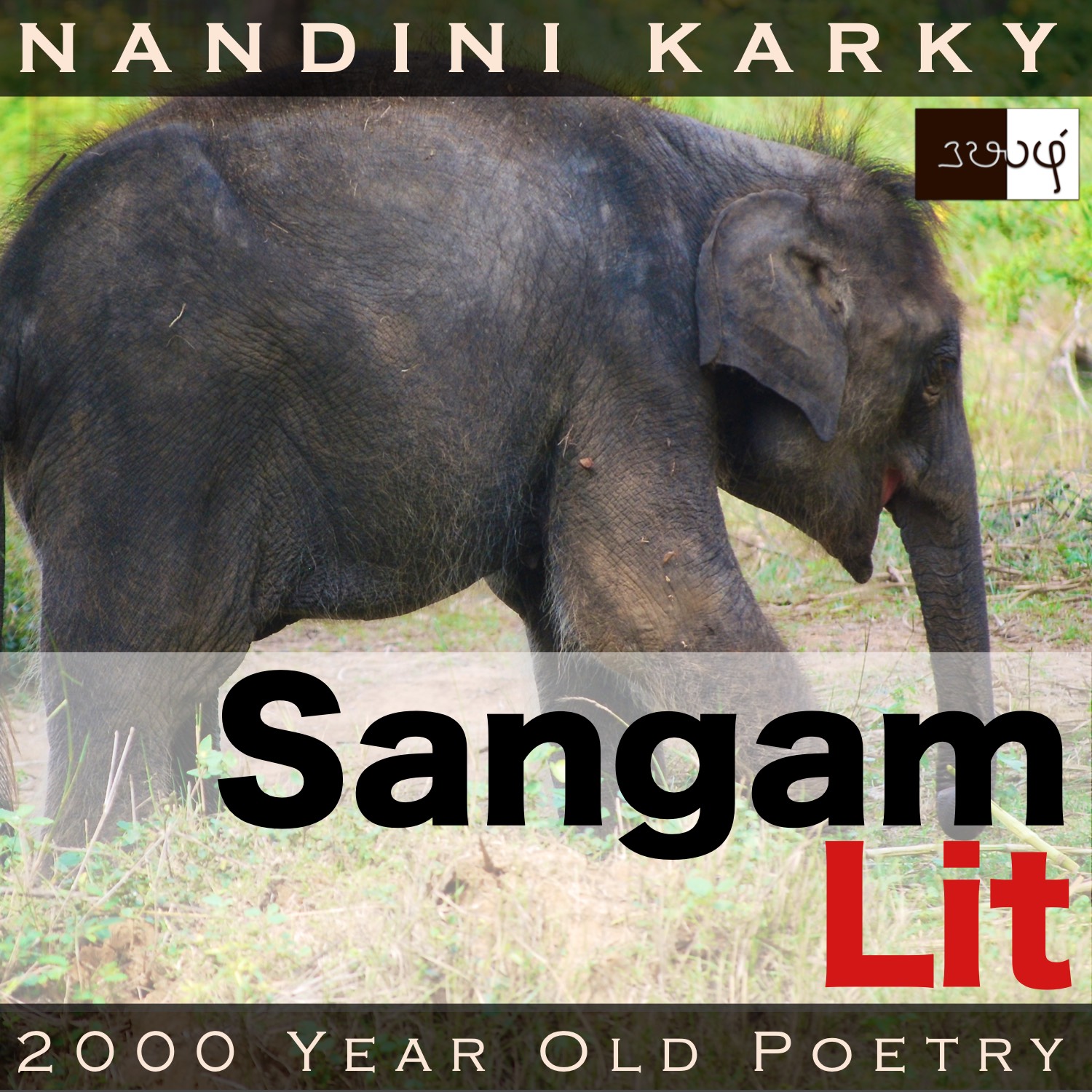Podcast: Play in new window | Download
Subscribe: Apple Podcasts | Spotify | Amazon Music | Android | iHeartRadio | Email | TuneIn | RSS | More

In this episode, we marvel at the nuanced instances from life used to portray the pain in parting, as depicted in Sangam literary work, Natrinai 171, penned by an anonymous poet. The verse is set in the ‘Paalai’ landscape of drylands and speaks in the voice of the confidante to the lady, conveying to her the message about the man’s parting away.
நீர் நசைக்கு ஊக்கிய உயவல் யானை
வேனிற் குன்றத்து வெவ் வரைக் கவாஅன்
நிலம் செல, செல்லாக் கயந் தலைக் குழவி
சேரி அம் பெண்டிர் நெஞ்சத்து எறிய
ஊர் ஆன்கன்றொடு புகுதும் நாடன்
பன் மலை அருஞ் சுரம் இறப்பின், நம் விட்டு,
யாங்கு வல்லுந மற்றே-ஞாங்க
வினைப் பூண் தெண் மணி வீழ்ந்தன நிகர்ப்பக்
கழுது கால்கொள்ளும் பொழுது கொள் பானாள்,
ஆர்வ நெஞ்சமொடு அளைஇ,
மார்பு உறப் படுத்தல் மரீஇய கண்ணே?
The poem opens with the phrase ‘நீர் நசை’, which is the ‘desire for water’, a feeling which brings to mind someone walking through a desert sipping the last drop of water on bent knees. Such dramatic scenes apart, conditions now threaten to make this, a commonplace experience to everyone on the planet. Returning to the present of the past, we glimpse at ‘உயவல் யானை’ meaning ‘a suffering elephant’ and ‘கயந் தலைக் குழவி’, ‘its tender-headed calf’. There’s not just an elephant’s little one, but ‘ஆன்கன்று’, ’calf of cows’ too. The phrase ‘வினைப் பூண் தெண் மணி’ talks about ‘a radiant gem encrusted on a jewel with skill’. Raising the tempo of fear, appears ‘கழுது கால்கொள்ளும்’ meaning ‘ghosts that grow feet’. However, Sangam folks do not clarify if those feet are backwards, as seems to be the popular belief about Indian ghosts! The verse ends with the serene image of ‘மார்பு உறப் படுத்தல் மரீஇய கண்ணே’ meaning ‘eyes that find rest on another’s chest’. Let’s explore the meaning behind these contradicting images of fear and calm!
The man and lady had been leading a happy, married life when the time comes for the man to leave her to gather wealth. He informs the lady’s confidante, requesting her to break the news gently to the lady. The confidante goes to the lady and says, “Desiring to quench its thirst, the troubled elephant moves towards the slopes surrounded by hot hills, which are assailed by summer winds. Unable to go with its mother, the tender-headed elephant calf stays with the cattle calves in the village, evoking surprise and awe in the hearts of womenfolk there. Such is the land of the lord! If he leaves you and parts away to walk through the harsh drylands surrounded by mountains many, how will your eyes summon the ability to bear this? Like someone who has lost a gem fitted with exquisite craftsmanship on a jewel, those eyes of yours that are used to resting on his chest, will not find any solace now at the time of the night when ghosts walk around, making hearts tremble anxiously.” With these words, the confidante speaks about the suffering the lady is about to experience, and at the same time, comforts the lady in a subtle manner.
Now, to explore the many images and emotions they conceal, at greater depth! The confidante opens the conversation by painting for us, the portrait of a she-elephant that suffers with uncontrollable thirst. This elephant knows that it must travel a long distance into the forests and mountains to reach those perennial lakes to quench its huge thirst. As it journeys on, its young calf is left behind owing to the dangers in the path, and it seeks the company of cattle calves in the village to bear with this separation from the mother. This entire scene is a metaphor for the man leaving the lady behind in her village and how she must seek the company and comfort of her playmates, as she awaits his return.
From that curious scene of an elephant calf left behind by its mother, the confidante summons the image of the man walking away on the harsh path through the drylands. She wonders what will be the state of the lady’s eyes, in the dark of the night when ghosts seemed to grow legs and roam about. The confidante concludes that like someone who has lost a precious gem from a jewel, those eyes cannot sleep now. How can they when those eyes are used to finding comfort on the chest of the man? The confidante paints such striking images of someone searching frantically for a small gem lost from a jewel; eyes that cannot close in the middle of the night; sounds of ghosts treading in the darkness of midnight; an elephant calf resting in the circle of cattle calves. With these images, the pain of parting is acknowledged and the consolation, akin to a friend’s hug, is offered!




Share your thoughts...